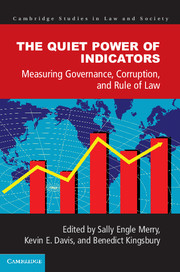Book contents
- Frontmatter
- Contents
- Notes on Contributors
- Acknowledgments
- Introduction: The Local-Global Life of Indicators: Law, Power, and Resistance
- PART I GLOBAL INDICATORS OF GOVERNANCE, CORRUPTION, AND RULE OF LAW
- Part II INDICATORS IN LOCAL CONTEXTS
- 6 Rule of Law Indicators as a Technology of Power in Romania
- 7 Indicators, Global Expertise, and a Local Political Drama: Producing and Deploying Corruption Perception Data in Post-Socialist Albania
- 8 Evaluating the Impact of Corruption Indicators on Governance Discourses in Kenya
- 9 Measuring Labor Market Efficiency: Indicators that Fuel an Ideological War and Undermine Social Concern and Trust in the South African Regulatory Process
- 10 Conclusion: Contesting Global Indicators
- Index
- Books in the Series
- References
7 - Indicators, Global Expertise, and a Local Political Drama: Producing and Deploying Corruption Perception Data in Post-Socialist Albania
from Part II - INDICATORS IN LOCAL CONTEXTS
Published online by Cambridge University Press: 05 June 2015
- Frontmatter
- Contents
- Notes on Contributors
- Acknowledgments
- Introduction: The Local-Global Life of Indicators: Law, Power, and Resistance
- PART I GLOBAL INDICATORS OF GOVERNANCE, CORRUPTION, AND RULE OF LAW
- Part II INDICATORS IN LOCAL CONTEXTS
- 6 Rule of Law Indicators as a Technology of Power in Romania
- 7 Indicators, Global Expertise, and a Local Political Drama: Producing and Deploying Corruption Perception Data in Post-Socialist Albania
- 8 Evaluating the Impact of Corruption Indicators on Governance Discourses in Kenya
- 9 Measuring Labor Market Efficiency: Indicators that Fuel an Ideological War and Undermine Social Concern and Trust in the South African Regulatory Process
- 10 Conclusion: Contesting Global Indicators
- Index
- Books in the Series
- References
Summary
INTRODUCTION
This chapter explores the production and circulation of a corruption perception survey in Albania. The indicator in question acts as a semiprivate quasi-indicator: “semiprivate” insofar as its design and production involve both private institutions (transnational consultancy firms, local market research centers) and public institutions (governmental funding agencies); and a “quasi-indicator” insofar as, like the indicators described by Davis, Kingsbury, and Merry (2012a, 2012b), it compares institutions to one another and over time, yet, unlike those of other indicators, its rankings are not compared or translatable to other countries or other rankings. The chapter examines the ways in which this survey acts as a “form of knowledge” and a “technology of governance” (Davis, Kingsbury, and Merry 2012b). The first part of the chapter draws attention to the heterogeneous “ecology” (Halliday 2012) of indicators, through a discussion of the institutions and sources of expertise involved in the making of its questionnaires. The second part traces the intended and unintended uses of indicators in the local political context. I trace the impact of the 2008 and 2009 survey data on a local political drama that enfolded around the allegations of afera korruptive (corruption affairs) involving the highest levels of government. In the public debate of this event, the United States Agency for International Development (USAID)/Institute for Development Research and Alternatives (IDRA) survey became an important actor in the public debacle between the US Ambassador John Withers, Public Prosecutor Ina Rama, and Prime Minister Sali Berisha.
The focus of this story is the “Corruption in Albania: Perceptions and Experience” survey conducted by the local market research institute, the Institute for Development Research and Alternatives (IDRA) with funding from the USAID Rule of Law funding from 2005 to 2010. The survey was known locally as “the USAID corruption perception survey,” despite the fact that it is IDRA that conducts the whole process of data collection, SPSS (Statistical Package for the Social Sciences) aggregation, and the distillation of the data into the final report.
- Type
- Chapter
- Information
- The Quiet Power of IndicatorsMeasuring Governance, Corruption, and Rule of Law, pp. 222 - 247Publisher: Cambridge University PressPrint publication year: 2015
References
- 2
- Cited by



